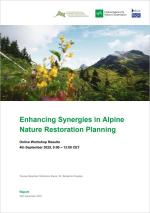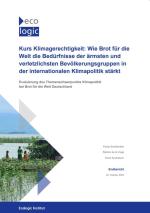Ecologic Institute Newsletter No 278 – November 2025
- Ecologic Institute Newsletter
Temporary Carbon Units from Carbon Farming and EU Agri-food Climate Policy – Report
This study explores how future EU policy tools – including the proposed Agricultural Emissions Trading System (AgETS), Mandatory Climate Standards (MCS), and public procurement programs – could integrate carbon farming without compromising high environmental standards. It highlights both the opportunities and risks of linking these instruments to the Carbon Removals and Carbon Farming Regulation (CRCF) and its system of temporary certified carbon units, while also examining alternative ways to promote climate-friendly farming.
Enhancing Synergies in Alpine Nature Restoration Planning – Workshop Results
Restoring nature in the Alps requires cross-border cooperation, as ecological processes do not stop at national borders. To foster shared approaches and synergies for implementing the EU Nature Restoration Regulation, the German Federal Agency for Nature Conservation (BfN) and Ecologic Institute organized an online workshop on behalf of the Alpine Biodiversity Board (ABB) of the Alpine Convention on 4 September 2025. The key findings and recommendations are now available in the workshop report.
Public Participation in EU Legislation? – Article
Anthropogenic litter poses a growing threat to aquatic ecosystems worldwide. While the EU's Marine Strategy Framework Directive (MSFD) addresses this pollution as an environmental status indicator, the Water Framework Directive (WFD) lacks such a measure. In the article, co-authored by Doris Knoblauch and Mandy Hinzmann of Ecologic Institute, the authors show how citizen science can help address this gap by leveraging existing litter data from related initiatives.
Restoring European Coastal Wetlands for Climate and Biodiversity – Article
This article analyzes the European Union's (EU) policy framework, alongside international and regional agreements relevant to wetland conservation and restoration, focusing on coastal ecosystems. The findings reveal two key gaps: first, an absence of a consistent definition of coastal wetlands within the EU policy framework; and second, the limited number of explicit policy references to these ecosystems. These shortcomings limit their effective inclusion in action plans and hinder coordinated conservation and restoration efforts.
Advancing Climate Justice in International Cooperation – Evaluation Report
The evaluation report "Kurs Klimagerechtigkeit: Wie Brot für die Welt internationale Klimapolitik stärkt" ("A Path to Climate justice: How Brot für die Welt Strengthens International Climate Policy") examines the work of Brot für die Welt’s Climate Policy Unit from 2023 to 2025. The independent review assesses the program's relevance, coherence, effectiveness, efficiency, development impact, and sustainability. The findings highlight Brot für die Welt's important role in amplifying the voices of those most affected by climate change, particularly in the Global South. Key achievements include helping shape the Loss and Damage Fund and strengthening civil society's participation in international climate negotiations. The evaluation also provides forward-looking recommendations: focusing on the organization's core strengths, empowering partners, diversifying funding, and creating new narratives to link climate justice with broader social goals.
Dynamic Ocean Management in Arctic Waters – New Dynamic with the BBNJ Agreement?
Moderation and Speech: Fenja Kroos, Arne Riedel
At the Arctic Circle Assembly 2025, Ecologic Institute contributed key expertise on legal and governance aspects of dynamic ocean management under the new BBNJ Agreement. Fenja Kroos moderated the high-level panel, while Arne Riedel shared insights on how adaptive management and international cooperation can strengthen biodiversity protection in the Central Arctic Ocean.
The Role of Social Innovation in Promoting Sustainable Consumption and Production
Speech: Dr. Zoritza Kiresiewa
On 21 October 2025, the 3-CO project hosted an online event highlighting how consumer perspectives and attitudes can shape powerful sustainability communication. In the second session, Noemi De Santes (Junker App), Florian Birk (SIGU Platform), and Zoritza Kiresiewa (Ecologic Institute) explored how social innovation can drive more sustainable consumption and production patterns. The discussion also drew on Ecologic Institute's policy paper, "Enabling Change from the Ground Up: Policy Recommendations to Foster Social Innovation in Europe."
Bridging Science and Policy – Exploring the Marine Protection and Climate Adaptation Nexus
Speech: Dr. Nico Stelljes, Gregory Fuchs
How can measures for marine protection and climate adaptation complement rather than compete with each other? This guiding question shaped the MEER:STARK Final Event, which took place on 3 and 4 November 2025 at Ecologic Institute in Berlin. Experts from science, policy, and practice discussed how eutrophication can be reduced, nature-based coastal protection strengthened, and Marine Protected Areas made more climate-ready. The discussions focused on shared analyses, examples of effective approaches, and ideas for better aligning marine protection and climate adaptation, with the aim of fostering synergies and strengthening the dialogue between science and policy.
Reflection on Collected Waste Data from Coastal Areas in the Citizen Science Project "Plastic Pirates"
Speech: Doris Knoblauch
During the first day of the PartWiss 2025 conference, Doris Knoblauch delivered a presentation on the Europe-wide citizen science project 'Plastic Pirates – Go Europe' as part of the 'Participatory Approaches to Shaping the Science-Policy Interface' thematic session. Her presentation demonstrated that citizen science generates scientific data and promotes environmental awareness and participation. Exciting findings on young people's perceptions of the plastic problem were presented, along with methodological insights into the research process.
Paths to a Near-natural Landscape Water Balance
Speech: Dr. Benjamin Kupilas
At this year's DWA Conference on River Basin Management, Dr. Benjamin Kupilas explored how landscapes can be designed to store water more effectively, buffer extreme events, and simultaneously support biodiversity. His talk highlighted the importance of restoring natural hydrological processes as a cornerstone of climate mitigation and adaptation, nature conservation, and resilient regional development.
EU Climate and Energy Policy in a Polarising World – Conference
The Kopernikus project Ariadne invites to this year's edition of the Ariadne@Brussels workshop series. From 8 to 10 December 2025, Ariadne researchers will present their latest findings on EU climate and energy policy and discuss them in an informal, focused setting with policy makers and stakeholders. We look forward to seeing you there!
Contents
- Publications
- Temporary Carbon Units from Carbon Farming and EU Agri-food Climate Policy – Report
- Enhancing Synergies in Alpine Nature Restoration Planning – Workshop Results
- Public Participation in EU Legislation? – Article
- Restoring European Coastal Wetlands for Climate and Biodiversity – Article
- Advancing Climate Justice in International Cooperation – Evaluation Report
- Recent: Presentations and Events
- Dynamic Ocean Management in Arctic Waters – New Dynamic with the BBNJ Agreement?
- The Role of Social Innovation in Promoting Sustainable Consumption and Production
- Bridging Science and Policy – Exploring the Marine Protection and Climate Adaptation Nexus
- Reflection on Collected Waste Data from Coastal Areas in the Citizen Science Project "Plastic Pirates"
- Paths to a Near-natural Landscape Water Balance
- Register Now!
- EU Climate and Energy Policy in a Polarising World – Conference


